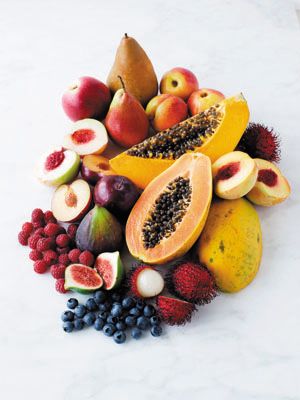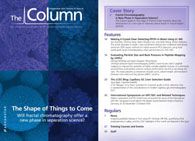Pesticides in Fruit Determined by Fast LTP–Orbitrap–HR–MS
A team of scientists from the University of Muenster and the University of Siegen in Germany has demonstrated the use of low temperature plasma desorption/ionization orbitrap high-resolution mass spectrometry (LTP–Orbitrap–HR–MS) for the analysis of pesticide residues in fruit.
Photo Credit: Cultura/Getty Images

A team of scientists from the University of Muenster and the University of Siegen in Germany has demonstrated the use of low temperature plasma desorption/ionization orbitrap high-resolution mass spectrometry (LTP–Orbitrap–HR–MS) for the analysis of pesticide residues in fruit.(1)
Pesticides are routinely used to protect crops from disease and infestation, and there is strict legislation in force to ensure that the maximum residue levels (MRLs) are adhered to. Quantification of pesticides in crops is therefore routinely performed to ensure the safety of consumers. Liquid chromatography (LC) or gas chromatography (GC) coupled to MS is typically used for this. However, it is the time-consuming sample preparation step that limits the applicability of this as a fast screening method.
In this study, the team evaluated which steps could be eliminated to develop a faster LTP–Orbitrap–HR–MS method with respect to European Union (EU) legislation. The team focused primarily on those pesticides that have been reported to exceed legal MRLs in Germany (acetamiprid, cyprodinil, fenhexamid, and fludioxonil). After method optimization, samples were analyzed by LTP–Orbitrap–MS to identify pesticides in spiked and unspiked fruit QuEChERS extracts. Several experiments were performed to evaluate and confirm the method: Firstly, calibration curves with standard solutions of each pesticide were determined. Potential matrix effects in grape and raspberry extracts were evaluated with matrix matched calibrations and spiked samples. Matrix-matched calibration was applied for quantification because it was found that the fruit matrix (still present during extract analysis) had a significant effect on analyte ion abundance.
For most pesticides, linear working ranges greater than four orders of magnitude were achieved. Limits of quantification (LOQ) ranged from 0.001 mg/kg to 0.07 mg/kg;
significantly below the permitted MRL. Method precision was below 14% relative standard deviation (RSD). These results were directly compared to results obtained from an LC–ESI–HR–MS method and were found to be in good correlation. Finally, the validated LTP–Orbitrap–HR–MS method was tested with unspiked fruit samples bought from a local grocery store. Pesticide residues of cyprodinil and fludioxonil (0.003–0.03 mg/kg) were easily detected in the shop-bought grapes and raspberries.
The team concluded that LTP–Orbitrap–HR–MS is a fast screening method for pesticide residues in fruit, particularly for those pesticides studied in the experiment. It is also suitable for highlighting those pesticides that
exceed MRLs and can verify sub-MRLs in fruit. — K.M.
Reference
Carsten Engelhard et al., Anal. Methods6, 5463–5471 (2014).

New Study Reviews Chromatography Methods for Flavonoid Analysis
April 21st 2025Flavonoids are widely used metabolites that carry out various functions in different industries, such as food and cosmetics. Detecting, separating, and quantifying them in fruit species can be a complicated process.
Analytical Challenges in Measuring Migration from Food Contact Materials
November 2nd 2015Food contact materials contain low molecular weight additives and processing aids which can migrate into foods leading to trace levels of contamination. Food safety is ensured through regulations, comprising compositional controls and migration limits, which present a significant analytical challenge to the food industry to ensure compliance and demonstrate due diligence. Of the various analytical approaches, LC-MS/MS has proved to be an essential tool in monitoring migration of target compounds into foods, and more sophisticated approaches such as LC-high resolution MS (Orbitrap) are being increasingly used for untargeted analysis to monitor non-intentionally added substances. This podcast will provide an overview to this area, illustrated with various applications showing current approaches being employed.

.png&w=3840&q=75)

.png&w=3840&q=75)



.png&w=3840&q=75)



.png&w=3840&q=75)








